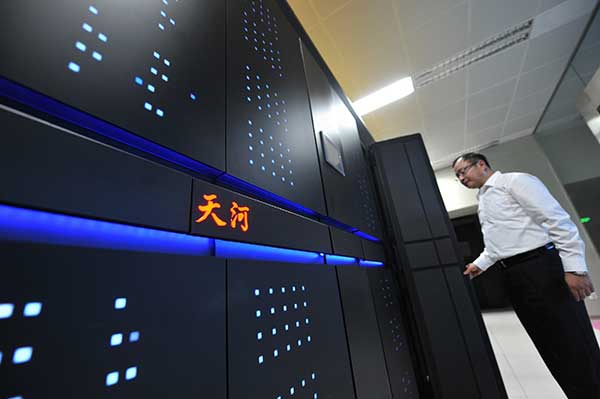
Tianhe-2, the world's most powerful supercomputer, was developed by China's National University of Defense Technology and deployed at the National Supercomputer Center in Guangzhou. Long Hongtao / Xinhua
Guangzhou, the capital of Guangdong province, plans to double its fiscal expenditure on science and technology to incubate high-tech startups, seeking a new identity as an international hub of scientific and technological innovation, said government officials.
The foreign trade and commerce center saw year-on-year economic growth of 8.4 percent last year, bringing the full-year GDP to 1.81 trillion yuan ($275 billion), ranking third in China for the 27th consecutive year, according to a government work report released on Monday.
Guangzhou aims to have an average annual GDP growth rate of above 7.5 percent during the 13th Five-Year Plan (2016-20), Mayor Chen Jianhua revealed while delivering the work report at the opening of the city's annual legislative session.
"Given that traditional industries' power in driving economic growth is weakening, we are stepping up efforts to encourage scientific and technological innovation in order to push forward industrial transformation and upgrading," Chen said.
"We will increase R&D expenditure to 3 percent of GDP during the 13th Five-Year Plan and develop Guangzhou into a national central city in terms of innovation."
The figure was around 2 percent in 2014, according to Zhao Xiaoxi, director of the planning department at the Guangzhou Science Technology and Innovation Commission.
"Providing better leverage through increased fiscal expenditure, we want to encourage enterprises to invest more in R&D," Zhao said, adding that tax reductions and subsidies will be offered to new scientific institutes and high-tech startups.
Guangzhou has its eyes on biological medicine, computer science and intelligent manufacturing to fuel its economic growth. The city contains two-thirds of the universities and all the key national laboratories in Guangdong province, and hosts the world's fastest supercomputer Tianhe-2, according to Nanfang Daily.
The government is also building a corridor for scientific and technological innovation that links the Sino-Singapore Guangzhou Knowledge City and Guangzhou Science City in the north, Guangzhou International Bio Island and the higher education mega center in the middle, and the innovation park in Nansha district in the south.
The corridor can also extend southward to Dongguan, Shenzhen and Hong Kong.
"Guangzhou can be the leader of innovation in the Pearl River Delta, by linking the research platforms in Guangzhou, the innovation atmosphere in Shenzhen and the manufacturing base in Dongguan through the corridor," Li Lixun, a professor of city planning at Sun Yat-sen University, told Nanfang Daily.


















































